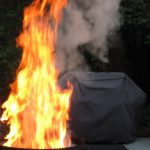 Grease fires are unfortunately an all too common danger in the cooking, and especially the barbecue, and live fire outdoor kitchen environment. Meats marbled with fat, and poultry dripping oil directly on to an open flame can cause real problems for the apathetic pit master. When you set out to grill use extra caution with high fat content meats like ground beef, sausages and skin on meats like chicken and pork.
Grease fires are unfortunately an all too common danger in the cooking, and especially the barbecue, and live fire outdoor kitchen environment. Meats marbled with fat, and poultry dripping oil directly on to an open flame can cause real problems for the apathetic pit master. When you set out to grill use extra caution with high fat content meats like ground beef, sausages and skin on meats like chicken and pork.
Of course you should never leave any open flame unattended. It takes mere moments for flare ups to run out of control. By the time you walk inside the house to get a beverage in the refrigerator you could have a blaze on the kettle grill.
First, if you expect dripping oil or any pooling grease at all consider using a drip pan and an indirect heat source (off set flame or coals) before you cook.
Place a sturdy aluminum pan filled with water (juice or beer may be nice) under the grate beneath the meat or drips. This will avoid major flare ups and protect succulent meats from over cooking. Indirect heat like this is usually desired for cuts thicker than the palm of your hand.
Second, make sure you start with a clean grill. A dirty grill can mean pooling oil and grease that can ultimately flare up.
Third, have a dry chemical fire extinguisher handy whenever grilling. It’s O.K. to use the one temporarily from the kitchen (you DO have one in your kitchen right)? Baking soda can also be used to stop a small grease fire. You may need a lot (and baking flour!)
Fourth, NEVER spray water on a grease fire. It will most likely flare up and spread.
Fifth, In the kitchen you can often cover a grease fire with a pan lid. to cut off oxygen. This is very difficult on a grill grate. A heavy wool or flame retardant blanket can sometimes smother a flame.
And finally do not try to move the flaming material. Turn off the burners and if all else fails get away and call 911.
Flare ups can be a real danger with live fire cooking. Keep charcoal grills off wood decks and all grills clear of vinyl siding. In fact its good practice to remove any and all flammable material at least ten feet away from active and hot grills and barbecues. This includes the ground (dry grass can catch fire in an instant in the dry summer months). Use some advance planning and keep it safe.
[…] A word about flare ups: Because there is a tendency for fats to drip on the charcoal bed which can serve as fuel for flames, one needs to be extra careful. To avoid flare ups, make sure that your grills are clean and free from fat. Also, before grilling, trim the ribs off excess fat. When flare ups happen, carefully move the ribs (if you can) to the cooler side then cover the grill to extinguish the flame. Always have a dry chemical fire extinguisher handy. Worse comes to worse, call 9-11. […]